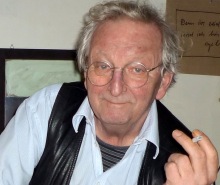Address by Peter Bichsel

Nation, that is a grand word and a lofty one, a word that has been abused everywhere time and again. How quickly it becomes an avowal, a creed, a religion, and how many people are persecuted owing to their nationality? When national teams meet, it takes millions of francs to ensure a degree of safety. A choir of nations, that is a dream. It was the dream of the League of Nations before World War II, the dream of the United Nations after the war, and the dream in the many national and international wars.
Nation, that is a grand word. The actual singing “Choir of Nations“, however, refers to something much smaller; it only refers to being together, belonging together. Music can’t be used as an argument though - there are also the songs of evil and inhumanity, and a people having symphonies needn't also be a people having a civilised culture, as Max Frisch wrote. A nation that has football, a nation that has songs, doesn’t necessarily have to be a peaceful one.
And even in the positive term “integration“ more and more hostile overtones may be made out. “It’s time they learnt German!“ we hear from the lips of some politicians like a call for extra homework. And with whom should they speak once they have learnt it? Maybe with us? There is no unilateral integration. If you want integration you have to be willing to integrate yourself. Learning languages is beautiful, but it should not be the prerequisite for integration, but rather its consequence. Young Turkish people, young Kosovar Albanians experience it painfully: They speak our dialect and are still expected to keep to themselves.
When I, as a young child, sang with my grandfather or with my mother, we were equals. Both of us were children then, both human beings. I experienced integration then, I belonged. It is not only foreigners who have to learn this, but everybody.
The “Choir of Nations“ may have a grand name and one that reminds us of the many failures of the great ones. But it points to something unassuming: to being together. Being together also prior to being and speaking alike. And because it points to something unassuming, it is a hope, a small hope. I thank you for that.
Peter Bichsel


